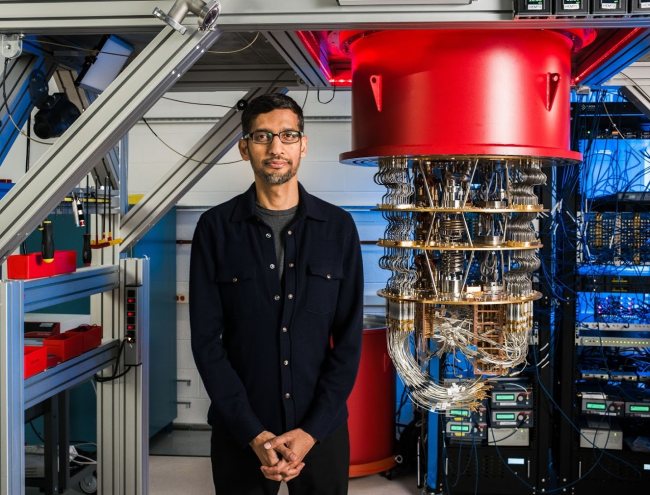Google has announced that it has reached quantum supremacy, thanks to a computer that can solve in a few seconds a problem that a terminal would solve in 10,000 years.
An important step forward in the history of computer science. Assuming it is “true”. Google has announced that it has reached the goal of quantum supremacy, which is the absolute primacy in computational computing capacity. In an article published in Nature magazine, Google AI Quantum Lab researchers led by Frank Arute explained the details of the company. The computer engineers of the giant of Mountain View used a quantum computer to solve a problem that with a classic computer would take a very long time. A quantum computer is a computer that is based on the principles of quantum mechanics. Instead of bits, the core units of computer science, a “quantum computer” uses qubits. If a bit can store information like a 1 or a 0, the qubit can take into account both data simultaneously. Moreover, the “heart” of a quantum computer are not silicon transistors but constantly moving electrons that can assume different states during the execution of any calculation operation. All this means that a quantum computer is able to solve very complex computational problems while simultaneously evaluating multiple solutions.
Google’s quantum supremacy: what does it mean?
The authors of the “conquest” illustrated on Nature the process that led them to achieve quantum supremacy thanks to the programmable processor Sycamore. “Sycamore takes about 200 seconds to sample an instance of a quantum circuit a million times: our benchmarks currently indicate that for a classic state-of-the-art supercomputer this same work would take about 10,000 years. This substantial increase in speed compared to all known classical algorithms is an experimental realization of quantum supremacy,” is the explanation that the technicians have given after the achievement of the goal. As significant as it is, therefore, the result obtained by Google scientists is “only” an experimental realization. Obtained under exceptional “conditions”: the components of Sycamore are made of indium, a very rare and very malleable metal and the processor is kept at a temperature close to zero (ie, around -273 degrees Celsius). Google’s conquest marks an important step forward in the history of computer science but, to say that it has actually reached quantum supremacy, there is still a lot of work to be done. As the authors of the article themselves admit: “A lot of work is needed before quantum computers become a practical reality. In particular, algorithms will have to be developed that can be commercialized and operate on noisy intermediate scale quantum processors (subject to errors) that will be available in the short term.
